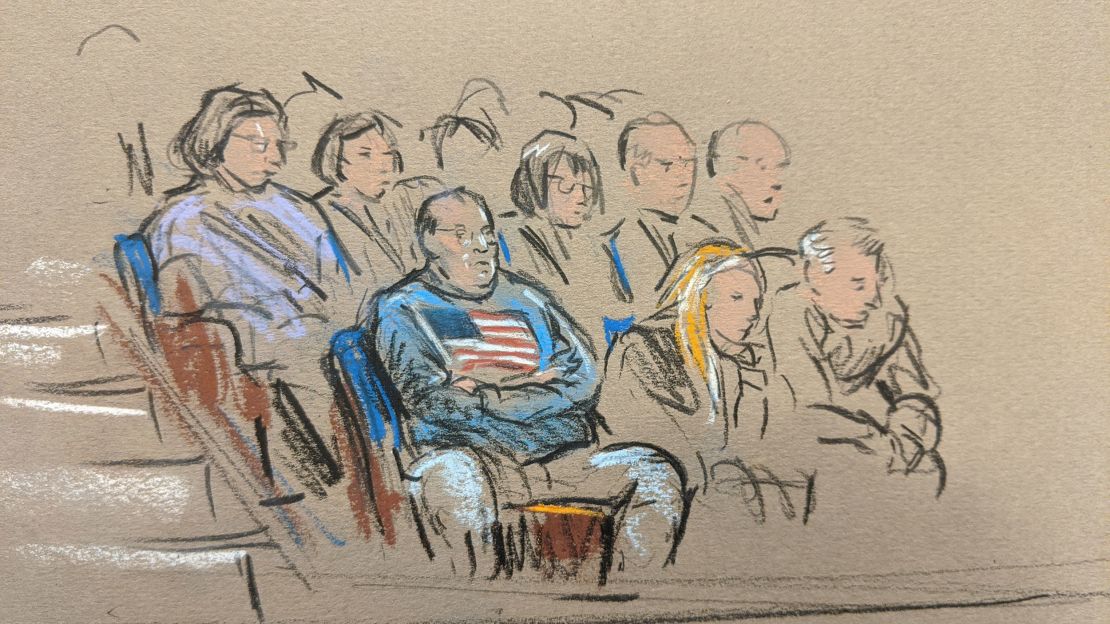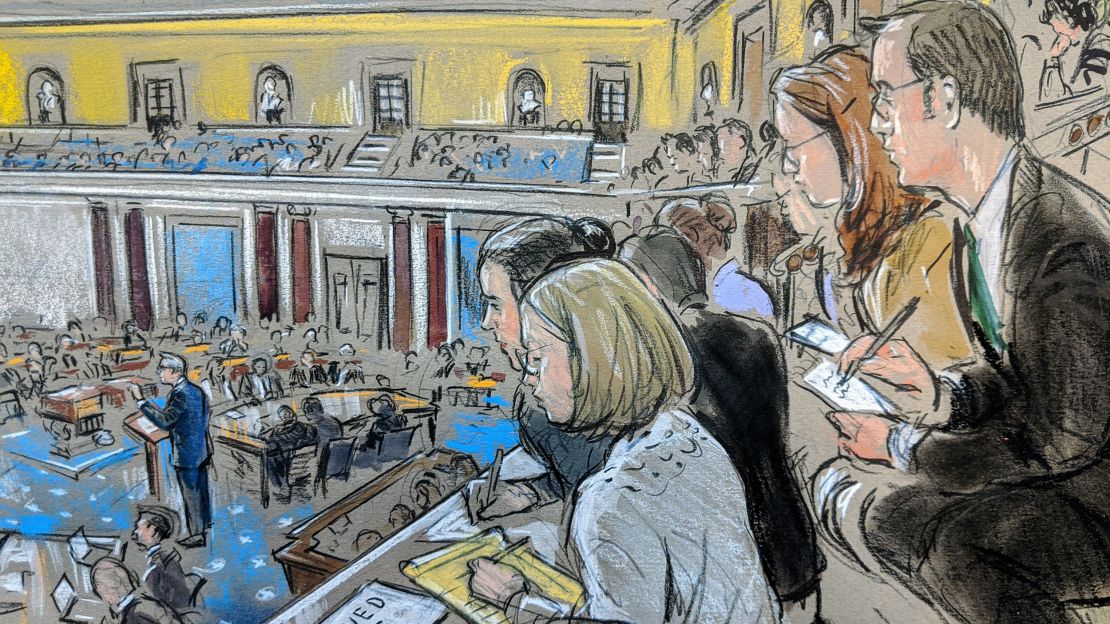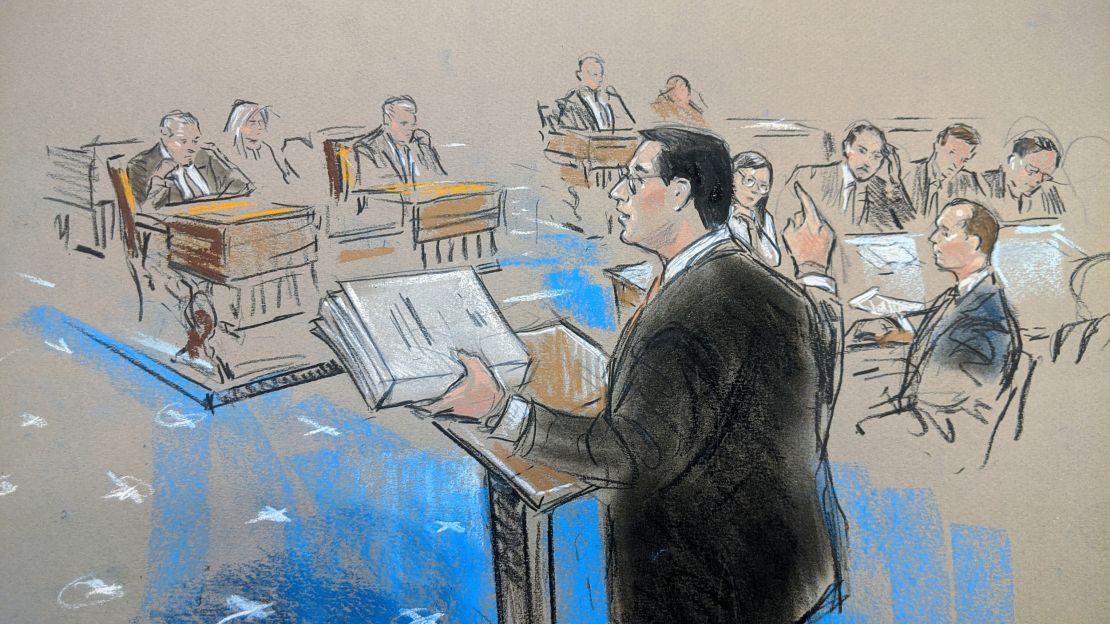A version of this story appears in CNN’s Impeachment Watch newsletter. To get it in your inbox, sign up for free here.
An explosive New York Times report detailing an unpublished draft manuscript by former national security adviser John Bolton has added new uncertainty to this week’s crucial vote to determine whether the Senate should subpoena witnesses and documents in President Donald Trump’s impeachment trial, several GOP sources said.
Citing multiple people’s description of the unpublished draft manuscript by Bolton, the Times reported that Bolton claims Trump told him in August that he wanted to continue holding military aid to Ukraine until the country helped with investigations into Democrats – including former Vice President Joe Biden.
A source with direct knowledge of the manuscript told CNN the Times’ telling of Bolton’s account of the Ukraine aid hold discussion with Trump is accurate.
In a series of late night tweets, Trump denied claims he told Bolton aid to Ukraine was tied to an investigation of the Bidens. “I NEVER told John Bolton that the aid to Ukraine was tied to investigations into Democrats, including the Bidens. In fact, he never complained about this at the time of his very public termination,” Trump tweeted.
Before the Times report, GOP leaders were confident that they would defeat the vote this week. But now, it is less certain, according to three GOP sources.
“The witness vote was always going to be tough,” said one source involved in the strategy. “The story makes that clear again.”
Democrats quickly highlighted the Times report to bolster their calls for Bolton to testify. Here’s a look at the procedural process before any witness testifies publicly:
- Once the Senate is done hearing arguments from Trump’s defense team, there will then be up to 16 hours of senator questions submitted in writing and then four hours of debate on whether to subpoena witnesses and documents. After the debate, the Senate will vote. If that motion gets 51 votes, then the Senate could move ahead with further votes to determine who to subpoena, including Bolton.
- If 51 senators then vote to subpoena Bolton, the Senate resolution says he first must be privately deposed. After that, the Senate would have to decide whether to make him testify in public.
- This means that the trial could be in limbo for sometime if the Senate decides to subpoena Bolton, especially given the legal battles that may ensue from any potential White House attempts to block the testimony. But if the Senate defeats the first motion to subpoena witnesses and documents, Trump may soon be acquitted.
The purported revelations from Bolton come as the President’s legal team begins to take control of the Senate floor to deliver their arguments, detailing the defense of Trump after three days of listening to arguments from the House impeachment managers.
The defense counsel’s presentation Saturday sought to poke holes in the Democratic case, arguing the House didn’t provide the full context during their argument and using snippets of witness testimony from the House Intelligence Committee to argue there was no quid pro quo with Ukraine.
“We don’t believe that they have come anywhere close to meeting their burden for what they’re asking you to do,” White House counsel Pat Cipollone said. “In fact, we believe that when you hear the facts, and that’s what we intend to cover today – the facts – you will find that the President did absolutely nothing wrong.”
But where will Trump’s defense team go in the week ahead? Well, Biden is expecting some attention.
“Look, they’ve been going full bore at me all the time and all it’s gone is gone up,” Biden told CNN on Sunday in Des Moines, Iowa. “Look, you guys know it’s a bunch of malarkey.”
Speaking briefly to reporters after an event with the International Association of Bridge, Structural and Ornamental Iron Workers, Biden said he does not feel he will need to respond to the defense team as it resumes its presentation this week.
Biden said “I’m expecting they will” make him a focus, adding, “That’s why (Trump’s) in trouble.”
Witness watch
Even before Sunday’s New York Times story, Sen. Mitt Romney said that it’s “very likely” that he’ll be in favor of calling witnesses in the impeachment trial, but won’t decide until after opening arguments.
- Remember: Democrats need four Republicans to vote with them in favor of subpoenas for witnesses or new evidence in order to extend the trial and gather new information.
Realistically, there are only maybe four GOP senators who would vote in favor of calling witnesses who could testify against the President. That short list includes Romney, relative moderates Sens. Susan Collins of Maine and Lisa Murkowski of Alaska, and endangered senators up for reelection like Sen. Cory Gardner of Colorado.
Collins and Murkowski have also signaled that they’re open to hearing from witnesses, should they feel it’s needed after opening arguments.
Nadler to miss parts of Senate trial
House Judiciary Committee Chairman Jerry Nadler on Sunday announced he will miss parts of the ongoing Senate impeachment trial to help take care of his wife as she undergoes cancer treatment.
“In December, following the House Judiciary Committee markup of the Articles of Impeachment against President Donald J. Trump, my wife was admitted to the hospital where she was diagnosed with Pancreatic Cancer. She has undergone surgery and is taking further steps to address the spread of the cancer,” Nadler said in a statement on Sunday.
“On Monday, I will be in New York with her to meet with doctors, determine a path forward, and begin her treatment. I am sorry to miss some of the Senate Impeachment Trial, which is of critical importance to our democracy.”
- As a House impeachment manager, Nadler is part of a select group of lawmakers acting as prosecutors for House Democrats and arguing the case against Trump in the Ukraine scandal – and he’s already played a key part in the House managers’ efforts to present a constitutional case for removing Trump from office.
The latest
House manager gets personal – On the final day of the opening argument to remove Trump from office, the lead impeachment manager, Rep. Adam Schiff of California, first turned to the little known Rep. Jason Crow of Colorado.
Crow, a freshman Congressman and military veteran, took on a key Republican argument: after a couple of months, the aid was released and Ukraine never announced the investigation into Biden sought by Trump.
“This defense would be laughable if this issue wasn’t so serious,” Crow countered. “Real people, real lives are at stake. Every day, every hour matters. So no, the delay wasn’t meaningless. Just ask the Ukrainians sitting in trenches right now.”
Trump’s attorney gets the SNL treatment – Trump’s attorney Alan Dershowitz, played by guest star Jon Lovitz, wound up in hell during the “Saturday Night Live” cold open.
Lovitz’s Dershowitz was meeting with Sens. Mitch McConnell (Beck Bennett) and Susan Collins (Cecily Strong) about the impeachment trial before he had a heart attack.
House manager’s hope – House impeachment manager Zoe Lofgren said Sunday she hopes Republican senators who have disagreed with a quote during the House’s opening arguments won’t let it shape their decision on whether Trump committed high crimes or misdemeanors.
Asked by CNN’s Jake Tapper on “State of the Union” if it was a “mistake” for Schiff, the lead Democratic impeachment manager, to quote a CBS News report during the final day of his team’s opening arguments, Lofgren, also a California Democrat, said she doesn’t know if it was.
“But hopefully the senators are not going to be letting a – quoting a CBS report which Adam himself said (he) didn’t know if that was accurate in making a decision for the country in whether the President has committed high crimes and misdemeanors,” she said. “I can’t believe the President’s misbehavior would be ignored because of something like that.”
Parnas recording puts GOP on defense
The GOP is navigating the fallout of a nearly 90-minute recording released Saturday of Trump at a 2018 donor dinner that included indicted businessman Lev Parnas, the Soviet-born businessman the President has claimed he doesn’t know.
The tape features Trump speaking animatedly about removing the US ambassador to Ukraine Marie Yovanovitch – at one point stating, “Get rid of her!”
On Sunday, CNN’s Tapper pressed Republican Sen. James Lankford on the tape in an exchange that shows how far the GOP will go to defend the President.
Tapper: “…when asked about Parnas, President Trump said ‘I don’t know anything about him.’ This proves that’s not true.”
Lankford: “Yeah, this was a fundraising dinner back in the spring of 2018, a year and a half ago, where the President literally takes a bunch of pictures, he walks in, sits down at a dinner. It’s a dinner, 25 people or so. They have dinner and then he leaves. I don’t see that as a relationship.”
Tapper: “It’s a 90-minute recording.”
Lankford: “I understand that, but it’s a dinner. It’s 90 minutes over a dinner that he walks in and actually participates in this. It’s hard to be able to say to the President who meets a thousand people a day. Okay, do you know this person that was at a dinner with you a year and a half ago and to say you have a relationship…”
Head here for a refresher on Trump’s other interactions with Parnas.
Fact-checking Trump’s legal team
Trump’s legal team kicked off their opening arguments in the Senate impeachment trial Saturday morning.
In defending the President, Deputy White House Counsel Mike Purpura asserted the case is based on a set of key facts “that have not and will not change.”
Here’s a breakdown of these “facts” and other claims from CNN’s Facts First team:
Purpura said “the transcript shows that the President did not condition either security assistance or a meeting on anything. The paused security assistance funds aren’t even mentioned on the call.”
- Facts First: While no specific conditions for a quid pro quo were mentioned on the call, the exchange Trump had with Zelenksy raised eyebrows among some officials who listened to the phone conversation – because the US was withholding military aid from Ukraine at the time.
Aiming to make the case that Trump did not engage in a quid pro quo because the Ukrainians got what they wanted without ever announcing an investigation into the 2016 election or the Bidens, Purpura argued “a presidential meeting took place on September 25 without the Ukrainian government announcing any investigations.”
- Facts First: This is misleading. While an announcement of investigations never took place, it was planned and discussed between representatives of both the US and Ukraine. The plan was only halted after the withheld aid was released.
One key fact Purpura claimed was that “not a single witness testified that the President himself said that there was any connection between any investigations and security assistance, a presidential meeting or anything else.”
- Facts First: It’s true witnesses did not testify the President said anything about a quid pro quo, but other administration officials have testified to the existence of one.
The scenes you won’t see on TV
Press access to the Senate chamber for the impeachment trial has been severely restricted, and the only television coverage is through cameras controlled by the Senate itself.
But sketch artist Bill Hennessy has been at the impeachment trial this week, painting the scene on the Senate floor on day one, two, three, and four.
Here’s some of what he saw Saturday:























